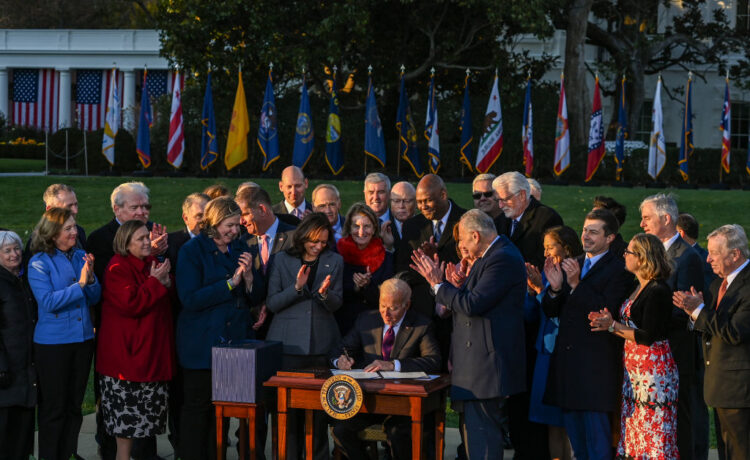U.S. President Joe Biden signs the Infrastructure Investment and Jobs Act as he is surrounded by lawmakers and members of his Cabinet during a ceremony on the South Lawn at the White House on Nov. 15, 2021. The $1.2 trillion package will provide funds for public infrastructure projects. (Photo by Kenny Holston/Getty Images)
When U.S. President Joe Biden signed the Infrastructure Jobs and Investment Act in 2021, it was hailed as a once-in-a-lifetime investment in our nation’s infrastructure and competitiveness, and rightfully so.
The bipartisan deal pledged to rebuild America’s roads, bridges and rail, but the bill goes even further. It expands access to clean drinking water, ensures every American has access to high-speed internet, tackles the climate crisis, advances environmental justice, and invests in communities that have too often been left behind.
Looking around Massachusetts, it’s easy to see the landmark legislation already bearing fruit; $4.2 billion has been allocated for federal highway improvements and $1.1 billion for bridge replacement and repairs. Add to that $2.5 billion for public transportation, including improving the MBTA, and it’s easy to see the transformative power of this bill for the commonwealth and the country.
While this investment in our critical transportation infrastructure is certainly welcome, funding alone is not enough. Those pledged taxpayer dollars must also be spent wisely to have the maximum positive impact on the communities where they are disbursed. It’s not just about communities and families having the benefit of newer, more efficient infrastructure; it’s also about those same local families having the opportunity to build that infrastructure through safe, well-paying, union construction jobs.
Elected officials at the municipal level need to ensure that infrastructure projects undertaken with funding from this legislation are properly awarded to union contractors employing skilled, trained, local workers. This is the only way to guarantee that the legislation’s goals of rebuilding America’s crumbling infrastructure and revitalizing local economies along the way are met fairly and equitably.
The benefits of union construction jobs for local residents are almost too great to calculate. On union job sites, local workers are paid a fair and liveable wage with which they can support a family. Those wages then re-circulate throughout the local economy as workers spend where they earn, meaning local businesses and schools benefit as well. On the homefront, families of union workers can rest easy knowing that they have the benefits they need to stay healthy, plan for retirement, and weather the storms that life can throw in anyone’s way.
For workers themselves, being on a union construction job means they know they’ll be able to work in safety and dignity. Union training programs means that workers know the person working alongside them knows what they’re doing and can get the job done right the first time. Union safety programs mean workers are operating along the same guidelines and following best practices, avoiding injuries and, in the case of large infrastructure projects, preventing potentially catastrophic accidents.
Municipal leaders can ensure that their constituents benefit from infrastructure projects being completed by union contractors by creating Project Labor Agreements or PLAs. PLAs put into writing the guarantee that workers receive strong wages, competitive benefits, and safe working conditions. Simply put, PLAs set the standard for the work union contractors perform on public infrastructure projects.
Local governments can also partner with labor unions to help secure climate change infrastructure and funding when they include community workforce agreements and other strong labor standards in infrastructure project proposals. This is especially true thanks to the Justice40 Initiative executive order that President Biden has already signed.
Under the Justice40 Initiative, the federal government has set a goal that 40% of the investments go to disadvantaged communities that are marginalized, underserved, and overburdened by pollution. Here in Massachusetts, that translates to communities across the commonwealth having the opportunity to secure resources to live healthier lives and for their residents to earn family-sustaining wages.
President Biden signed the Justice40 executive order because he recognized a truth that every mayor and town manager knows — in our 21st-century economy, infrastructure, climate action, and job creation must go together.
Union workers take pride in where we live. That sense of pride goes beyond earning a paycheck. It’s about knowing that we’ve done all that we can to improve our communities and make our neighborhoods safer, happier, and healthier places to live. With strong PLAs and a commitment to the goals of Justice40, we can build strong and thriving communities for generations to come. Let’s bring local officials and labor leaders together and make this happen.
Frank Callahan is the President of the Massachusetts Building Trades Unions (MBTU).













